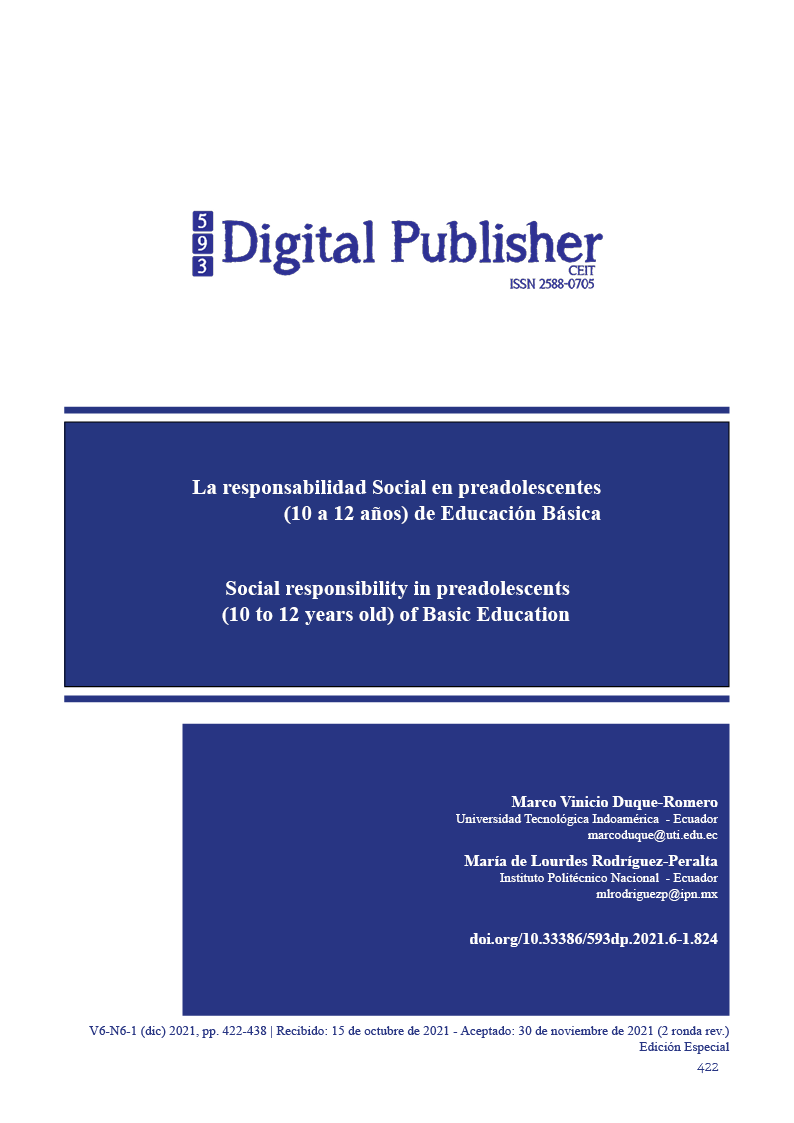La responsabilidad Social en preadolescentes (10 a 12 años) de Educación Básica
Contenido principal del artículo
Resumen
En el contexto de la pandemia por la COVID 19, es conveniente analizar las actitudes de los individuos ante una amenaza que ha modificado lo cotidiano; el desarrollo de valores personales apoyará en las crisis para aplacar sus efectos; es necesario profundizar en conceptos que se han percibido de forma superficial y que en ocasiones se los pasa desapercibidos sin enfocar esfuerzos para sembrarlos ni para fortalecerlos, para esto es importante analizar aportes académicos al respecto y así colaborar con la comunidad científica con otros estudios; se analiza la importancia de la actitud responsablemente social y su formación en etapa escolar. El presente trabajo plantea el objetivo de estudiar de la idea de responsabilidad social socioformativa con el apoyo de la cartografía conceptual para describir los elementos fundamentales que la componen y su importancia. Se emplearon métodos teóricos como el histórico lógico, análisis documental y sistematización, con apoyo en la cartografía conceptual; para lo cual se realiza una búsqueda en revistas científicas, apoyados en herramientas como Google Académico, Scopus, Mendeley, Redalyc y Scielo. Se analizan los 8 ejes propuestos por la cartografía conceptual en torno a la responsabilidad social socioformativa: noción, categorización, caracterización, diferenciación, división, vinculación, metodología y ejemplificación; partiendo del análisis de los aportes de diferentes investigaciones del tema. Problemas sociales en medio de las dificultades sanitarias; la Responsabilidad Social como un arma importante en las crisis; el aporte de la Responsabilidad Social desde la Socioformación con los elementos que la integran; y el impacto de la toma de decisiones individuales en la sociedad.
Descargas
Detalles del artículo

Esta obra está bajo una licencia internacional Creative Commons Atribución-NoComercial-CompartirIgual 4.0.
1. Derechos de autor
Las obras que se publican en 593 Digital Publisher CEIT están sujetas a los siguientes términos:
1.1. 593 Digital Publisher CEIT, conserva los derechos patrimoniales (copyright) de las obras publicadas, favorece y permite la reutilización de las mismas bajo la licencia Licencia Creative Commons 4.0 de Reconocimiento-NoComercial-CompartirIgual 4.0, por lo cual se pueden copiar, usar, difundir, transmitir y exponer públicamente, siempre que:
1.1.a. Se cite la autoría y fuente original de su publicación (revista, editorial, URL).
1.1.b. No se usen para fines comerciales u onerosos.
1.1.c. Se mencione la existencia y especificaciones de esta licencia de uso.
Citas
Ambrosio, R. (2018). La socioformación: un enfoque de cambio educativo. Revista Iberoamericana de Educación / Revista Iberoamericana de Educación vol. 76, núm. 1 (2018/04/01), pp. 57-82, ISSN: 1022-6508 / ISSNe: 1681-5653 https://rieoei.org/RIE/article/view/2955/3942
Arreola, A.; Palmares, G. & Ávila, G. (2019). La Práctica Pedagógica desde la Socioformación. RAES, 11(18), pp. 74-87. http://www.revistaraes.net/revistas/raes18_art5.pdf
Barron’s (26 de diciembre de 2020). La OMS Advierte Que El Covid-19 No Será "La última Pandemia". https://www.barrons.com/news/spanish/la-oms-advierte-que-el-covid-19-no-sera-la-ultima-pandemia-01609016406
BBC News Mundo. (9 de julio de 2020). La OMS y el coronavirus: el emotivo llamado a la unidad que hizo entre lágrimas el director del organismo. https://www.bbc.com/mundo/noticias-internacional-53356817.
Calzadilla-González, O.; Mendoza-Cevallos, A. & Díaz-Pompa, F. (2017). Análisis histórico-lógico de la formación de los profesionales de la educación primaria en el contexto ecuatoriano. Journal for Educators, Teachers and Trainers, Vol. 8 (1) pp. 157-166. https://dialnet.unirioja.es/descarga/articulo/6102436.pdf
Calzadilla, R. (2010). La crisis humana como una crisis en la formación de valores. Sapiens. Revista Universitaria de Investigación, vol. 11, núm. 2, julio-diciembre, 2010, pp. 57-74. Universidad Pedagógica Experimental Libertador. https://www.redalyc.org/pdf/410/41028422005.pdf
CEPAL. (15 de julio de 2020). Enfrentar los efectos cada vez mayores del COVID-19 para una reactivación con igualdad: nuevas proyecciones. COVID RESPUESTA, Informe Especial N°5 COVID 19. https://repositorio.cepal.org/bitstream/handle/11362/45782/S2000471_es.pdf?sequence=4&isAllowed=y.
COE (2020). RESOLUCIONES COE Nacional 22 de marzo de 2020. Comité de Operaciones de Emergencia Nacional. Ecuador. Gobierno Nacional. https://www.gestionderiesgos.gob.ec/wp-content/uploads/2020/03/Resoluciones-COE-Nacional-22-de-marzo-2020.pdf
De la Cruz-Ayuso, C. (2016). Universidades Jesuitas y Responsabilidad Social: una propuesta basada en la justicia solidaria. ARBOR Ciencia, Pensamiento y Cultura, Vol. 192-782, noviembre-diciembre 2016, a363. ISSN-L: 0210-1963. doi: http://dx.doi.org/10.3989/arbor.2016.782n6008. http://arbor.revistas.csic.es/index.php/arbor/article/view/2169/2926
Dulzaides, M. & Molina, A. (2004). Análisis documental y de información: dos componentes de un mismo proceso. ACIMED v.12 n.2 Ciudad de La Habana mar.-abr. 2004. ISSN 1024-9435 versión impresa. http://eprints.rclis.org/5013/1/analisis.pdf
Fontaneda-González. I. (2007). Localización: Aproximación al concepto de Responsabilidad Social: origen y evolución, hitos e implicación para las empresas. Anales de mecánica y electricidad, Vol. 84, Fasc. 5, 2007, págs. 21-25, ISSN 0003-2506. https://www.icai.es/contenidos/publicaciones/anales_get.php?id=1457
García-García, C. (2020). ¿Responsabilidad individual o colectiva? CatalunyaPress, LA NORMALIDAD ES RARA, Lunes, 18 de mayo de 2020. https://www.catalunyapress.es/texto-diario/mostrar/1958574/responsabilidad-individual-colectiva.
García-Navarro, G. (11(2), 51-72 de 2017). Razones y Propósitos para incorporar la Responsabilidad Social en la Formación de Personas y en Organizaciones de Latinoamérica. Revista Latinoamericana de Educación Inclusiva. ISSN: 0718-7378; www.rinace.net/rlei/.
Ibarra L., Fonseca, C. & Santiago, R. (2020). La responsabilidad social universitaria. Misión e impactos sociales. SINECTICA. Núm. 54. doi: 10.31391/S2007-7033(2020)0054-011
Johnson, M. C., Saletti-Cuesta, L., & Tunas, N. (2020). Emociones, preocupaciones y reflexiones frente a la pandemia del COVID-19 en Argentina. Ciênc. saúde coletiva 25 (suppl 1) 05 Jun 2020. https://doi.org/10.1590/1413-81232020256.1.10472020; https://www.scielosp.org/article/csc/2020.v25suppl1/2447-2456/es/.
Llorente, A., & Tombesi, C. (7 de agosto de 2020). Contagio de coronavirus: los gráficos que muestran cómo una reunión familiar terminó con 41 contagiados de covid-19 en apenas 16 días. BBC News Mundo. https://www.bbc.com/mundo/noticias-53642440.
Londoño, E. (2008). Los valores frente a los efectos de la globalización: ¿Crisis de valores o crisis de transición? AGO.USB Medellín-Colombia V. 8 N° 1 pp. 1-229 Enero-Junio 2008. ISSN: 1657-8031. https://dialnet.unirioja.es/descarga/articulo/5373064.pdf
Londoño, I. (2011). Aproximación al concepto de Responsabilidad Social desde el pensamiento del grupo de investigación en Responsabilidad social -GRS - EAM. Sinapsis 3 (3), 55-75. https://dialnet.unirioja.es/descarga/articulo/4955440.pdf
Martínez-Domínguez, L.-M., & Porto-Pedrosa, L. (2018). Creation of the observatory of educational social responsibility in LAtin America | Creación del Observatorio de Resposabilidad Social Educativa en América Latina. Revista Iberoamericana de Educación Superior, 9(26), 212-230. https://doi.org/10.22201/iisue.20072872e.2018.26.304.
Ministerio de Educación del Ecuador (2013), Acuerdo No. 0332-13. 6 de septiembre de 2013. https://educacion.gob.ec/wp-content/uploads/downloads/2013/09/ACUERDO_332-13.pdf
Mori, M. (2009). Responsabilidad Social. Una Mirada desde la Psicología Comunitaria. LIBERABIT: Lima (Perú) 15(2): 163-170, 2009. http://www.scielo.org.pe/pdf/liber/v15n2/a10v15n2.pdf
Organización Panamericana de la Salud [OPS] & Organización Mundial de la Salud [OMS]. (11 de Mayo de 2021 - 03:00 pm hora del este). Situación de COVID-19 en la Región de las Américas. https://www.paho.org/es/temas/coronavirus/brote-enfermedad-por-coronavirus-covid-19
Peña, J. (1998). Dimensiones críticas de la filosofía política: Sobre la responsabilidad política. RIFP/11 (1998) pp. 127-148. Universidad de Valladolid. http://e-spacio.uned.es/fez/eserv/bibliuned:filopoli-1998-11-1012/pdf
Pérez-Francesch, J. (2016). Por una sociedad de personas responsables. Reflexiones desde los valores cívicos. Ieee.es. Documento de opinión. 08 de enero de 2016. https://dialnet.unirioja.es/descarga/articulo/5992477.pdf
Rivera, N., & Lissi, M. R. (2004). La Responsabilidad Social: Cómo la Viven Tres Grupos de Estudiantes de Enseñanza Media en Chile. PSYKHE 2004, Vol. 13, Nº 2, 117 - 130. Pontificia Universidad Católica de Chile; https://scielo.conicyt.cl/scielo.php?pid=S0718-22282004000200009&script=sci_arttext.
Rojas, C. (2006). La pérdida de valores: Causa de males sociales. Centro San Camilo Vida y Salud, No. 22 (2006) Diálogo y Relación de Ayuda. http://www.cscbiblioteca.com/assets/01.-perdida-de-los-valores-online.pdf
Saravia, F. (2018). Emprender para transformar. Herramientas para una comunidad socialmente responsable. Editorial ECOE Ediciones. ISBN: 978-958-771-582-8. EAN: 9789587715828. https://www.ecoeediciones.com/wp-content/uploads/2018/02/Emprender-para-transformar-1.pdf
Severino-González, P., Martín-Friorino, V., & González-Soto, N. (2019). Social responsibility. From decision making to character education: Perceptions of teachers and non-Teachers in a children school |. Responsabilidad social. De la toma de decisiones a la educación del carácter: Percepciones de docentes y no docentes de un e. Estudios Sobre Educacion, 37, 69–90. https://doi.org/10.15581/004.37.69-90.
Severino-González, P., Medina, Á., & Pujol-Cols, L. (2018). Responsabilidad Social en Escuelas de Educación Primaria en Chile: Tensiones y Desafíos. Universidad Autónoma del Caribe. Vol. 16- 02 de julio-dic. En Revista Encuentros: DOI: http://dx.doi.org/10.15665/encuent.v16i02.974.
Tobón, S. (2012a). Cartografía Conceptual: estrategia para la formación y evaluación de conceptos y teorías. México: Instituto CIFE. https://issuu.com/cife/docs/e-book__cartograf__a_conceptual
Tobón, S. (2012b). El proyecto ético de vida y la socioformación. Instituto CIFE, Centro Universitario. Cuernavaca – México. https://issuu.com/cife/docs/e_book_el_proyecto_etico_de_vida_y_
Tobón, S. (2017). Ejes esenciales de la sociedad del conocimiento y la socioformación. Mount Dora (USA): Kresearch. DOI: dx.doi.org/10.24944/isbn.978-1-945721-18-2. Educación https://cife.edu.mx/recursos/wp-content/uploads/2018/09/Ejes-esenciales-de-la-sociedad-del-conocimiento-y-la-socioformaci%C3%B3n-09.pdf
Vázquez, J.; Hernández, J.; Vázquez, J.; Juárez, L. & Guzmán, C. (2016). El trabajo colaborativo y la socioformación: un camino hacia el conocimiento complejo. Revista Educación y Humanismo, 19(33),334-356.http://dx.doi.org/10.17081/eduhum.19.33.2648. https://dialnet.unirioja.es/descarga/articulo/6395383.pdf
Vélez-Romero, X. A., & Cano-Lara, E. D. (31 de agosto de 2016). Los diferentes tipos de responsabilidad social y sus implicaciones éticas. Dom. Cien., ISSN: 2477-8818; Vol. 2, núm. esp., dic. , 2016, pp. 117-126. Manabí, Manta, Ecuador: file:///C:/Users/Hp/Downloads/Dialnet-LosDiferentesTiposDeResponsabilidadSocialYSusImpli-5802930.pdf.
Viteri-Moya, J. (2010). Responsabilidad Social. ENFOQUTE. 1: 90-100; Copyright © 2010 Universidad Tecnológica Equinoccial; Facultad de Ciencias de la Ingeniería. Ecuador: ISSN: 1390-6542; https://com-mendeley-prod-publicsharing-pdfstore.s3.eu-west-1.amazonaws.com/23fe-CC-BY-2/10.29019/enfoqueute.v1n1.20.pdf?X-Amz-Security-Token=IQoJb3JpZ2luX2VjEPr%2F%2F%2F%2F%2F%2F%2F%2F%2F%2FwEaCWV1LXdlc3QtMSJIMEYCIQCvwP%2BZx%2FSgU2PiP%2F.



